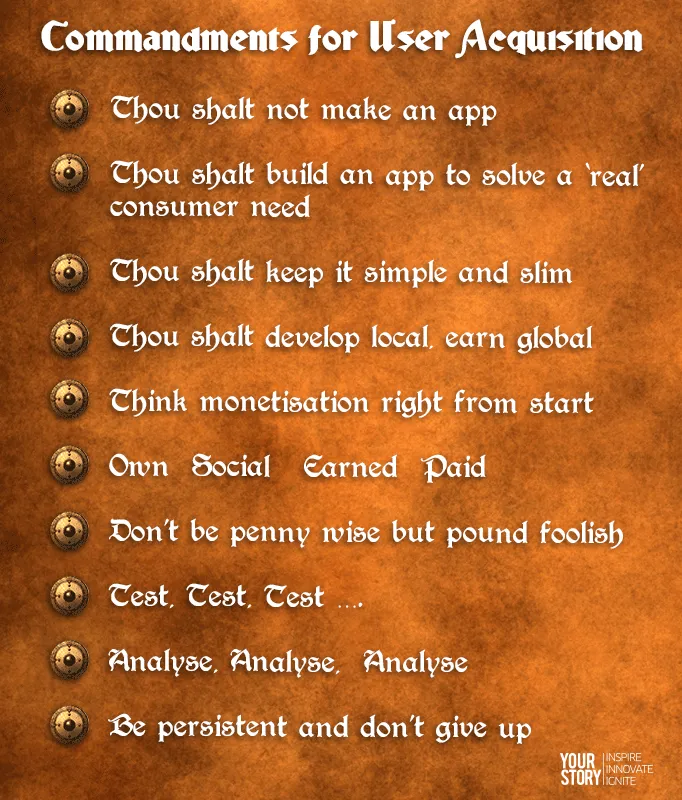10 commandments for user acquisition for apps
Today, the Indian app economy is booming beyond proportions. Gartner estimates it to be Rs 2,000 crore by 2016 and according to a recent report by IAMAI, India is seeing 100 million downloads per month.

The report from IAMAI also states that developers tend to spend 85 per cent of their development cost on just marketing. All this is for user acquisition, but there is still a high number of uninstalls which the industry is seeing.
We were at InMobi’s InDecode where Ankit Rawal, General Manager, InMobi and Raghuram Trikutam, Head of Mobile, FreeCharge helped us understand how to reduce these uninstalls.
#1 Thou shalt not make an app
The Purpose
Are you solving a real problem? Set out a clear reasoning and objectives to building the application.
Increasingly, retention and churn is an issue. Also ask yourself if you are trying to build a new market, altogether, and understand the dynamics involved in moving forward.
#2 Thou shalt build an app to solve a ‘real’ consumer need
Try addressing a real consumer issue while building the application.
#3 Thou shalt keep it simple and slim
It is essential to build an app with a design free of friction. Try making the app as simple as possible. While adding a feature, question its need. Ankit reiterated that heavier the app, more space it eats into, leading to higher chances of it being deleted. Thus, it needs to be as slim as possible.
Raghuram added: “Don’t bloat your app. Image optimisation is a must. Try building an app for 2G speeds as well while keeping the size of the app not more than five MB.”
“Go easy on the battery to reduce consumption. Go for the last known location, while using location services unless you are a hyperlocal app. Also, wake locks should be as per the needs,” he said.
#4 Thou shalt develop local, earn global
Try to ask yourself how your app can have a global appeal. Ḍon’t think of India and US alone as potential markets for your app. Try looking out of the box at other geographical zones. Europe, for example, has high revenues on the app.
Also, think utility, which companies like Clean Master, APUS and Baidu are building.
#5 Think monetisation right from start
This could be more useful for app developers building games. Think from the start as to how you could integrate advertisements without really destroying the UI. Try thinking of different stages where these monetisation avenues could be put. Also, try seeing if these avenues could coincide with what users are feeling at a specific stage of the game.
It would be wise to think local while choosing characters. Let people buy avatars based on culture. Ankit gives the example of Subway Surfer here.
#6 Own> social > earned > paid
Try understanding different avenues to promote the application. The ‘owned’ media is the company blog while ‘social’ is social media. ‘Earned’ could be through public relations and interactions with the media.
#7 Don’t be penny wise but pound foolish
You need to include things like analytics and might have to partner with organisations to understand how the app is performing to take it to the next level. One needs to be clever with the money investments, while not missing on the investments which could take the app to the net dimension.

#8 Test, test, test
Try to understand and experiment what could be better for the app. Following questions need to be asked - ‘What screenshot needs to be put?’ and ‘Are we digging enough on creative optimisation?’ Look at going vernacular because that’s where the next big audience is. Also, look at re-engagement.
#9 Analyse, analyse, analyse
As reiterated, invest in analytics tools and look at other initiatives and experiments to see how the app resonates with the audience.
#10 Be persistent and don’t give up
Ankit says building an app can be quite a tedious and exhausting process, but one must not give up.
Raghuram pointed out the need to be prudent with third-party Software Development Kits (SDKs). He also reiterated the need to keep the size of the app in check while loading assets on the fly.



